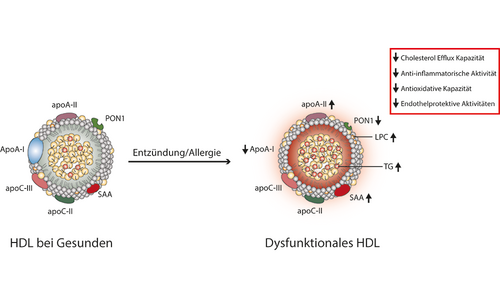-
The University
- Welcome
- Who we are
- Media & PR
- Studying
-
Research
- Profile
- Infrastructure
- Cooperations
- Services
-
Career
- Med Uni Graz as an Employer
- Educational Opportunities
- Work Environment
- Job openings
-
Diagnostics
- Patients
- Referring physicians
- Health Topics
- Health Infrastructure
Research team Marsche
Research focus: Metabolism and the gut
PI: Gunther Marsche
Focus: Our research team focuses on understanding the role of high-density lipoproteins (HDL) in inflammatory and allergic diseases. HDL are complex endogenous nanoparticles essential for maintaining metabolic balance and vascular health. They perform critical functions such as reverse cholesterol transport and immunomodulation. Their ability to interact with various immune and structural cells makes them central to the pathophysiology of many diseases. However, under conditions of inflammatory dysregulation, HDL can undergo pathogenic remodeling and post-translational modifications, leading to dysfunction or even pro-inflammatory effects. Our goal is to explore why HDL loses its protective properties in inflammatory diseases by investigating its intricate composition and assessing its diverse functionalities.
Projects
Apolipoprotein AI mimetic peptide lipid assemblies
HDL particles are highly complex, and their composition and function are significantly altered in inflammatory diseases. This creates a need to restore or even enhance the impaired functionality of HDL in such conditions. Apolipoprotein A-I (apoA-I), the most abundant protein in HDL, is primarily responsible for its well-recognized anti-inflammatory properties. In this project, we are investigating the structure and function of artificially synthesized peptides, ranging from 18 to 37 amino acids in length, that mimic various activities of full-length apoA-I when lipidated
Project duration: 2022-2025
Funding body: FWF
Project Partners*: Ruth Prassl (Medical University of Graz), Mounir Tarek (Laboratory of Theoretical Physics and Chemistry, University of Lorraine in France)
Synthetic high-density lipoproteins in allergic lung inflammation
Eosinophils play a central role in allergic inflammation, acting as versatile and key effector cells. HDL mimetic nanoparticles have emerged as a promising therapeutic option for hyper-eosinophilic conditions, such as asthma, where the migration of eosinophils from the bloodstream to affected tissues drives disease exacerbation. This project explores the pro-resolving effects of reconstituted HDL (rHDL) on eosinophil and neutrophil effector responses, as well as endothelial function. Additionally, rHDL is tested in models of allergic lung inflammation to evaluate its potential therapeutic benefits.
Project duration: 2021-2025
Funding body: FWF
Project Partners*: Katharina Jandl, Ruth Prassl (Medical University of Graz)




